Spotlight
You Showed Me How
Published
2 years agoon
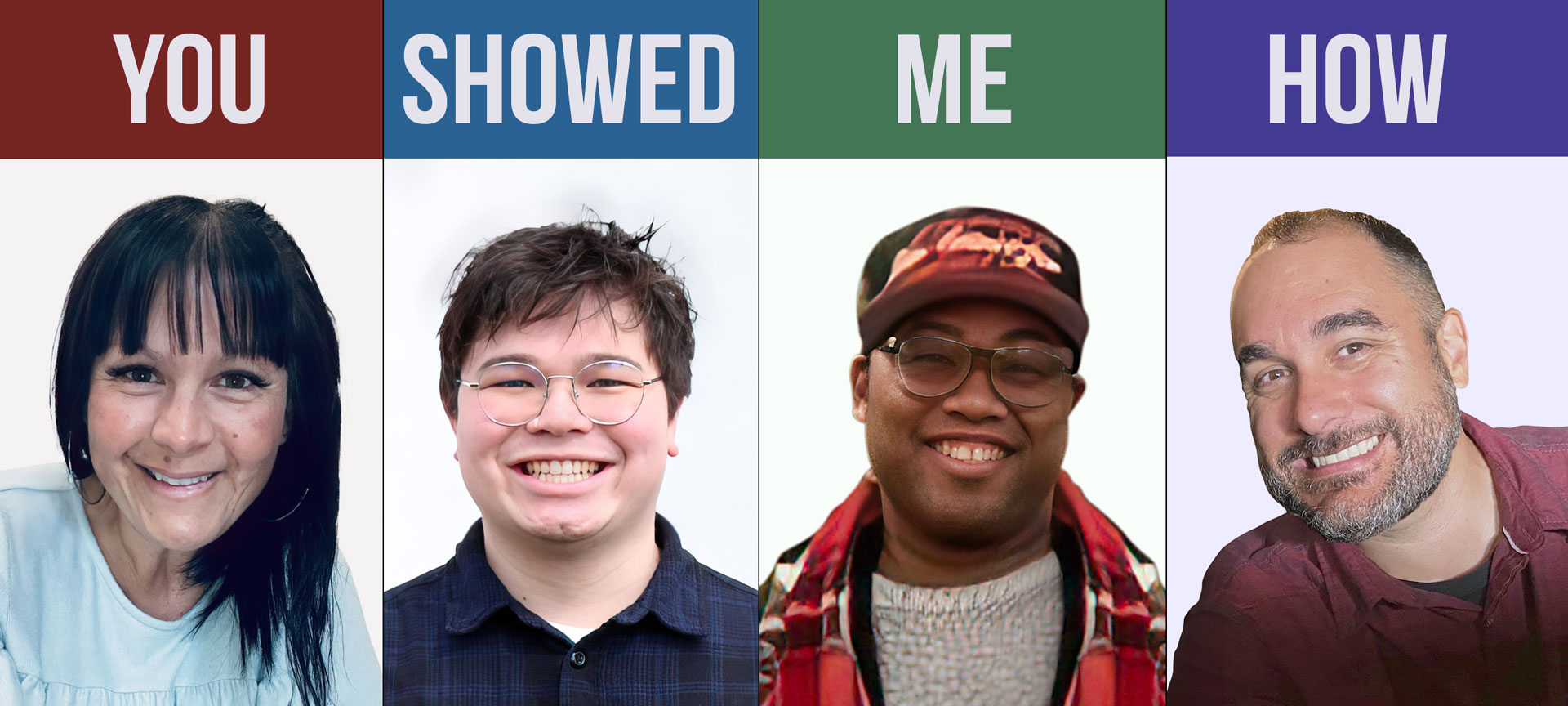
By Tim Zakarian
In last month’s article “Show Me How,” we talked about how to help someone who is newly saved take their next steps of faith.
To review that article, click here Show Me How.
Helping a person take their next steps of faith is important. When a person decides to put their faith in Christ, we often say they have been “born again,” they have been given a new life (John 3:1-3). Most mothers would never think of abandoning a newborn baby, leaving him or her to fend for themselves. In similar fashion, a new Christ-follower needs to be nurtured and protected. Yes, it is exciting that someone accepted the Lord as their Savior and has chosen to be born again, but it is also important they learn what it means to have a relationship with Christ. It is important we disciple them.
In “Show Me How” we provided some ideas for discipleship. In this article we want to share real stories of four people who were discipled intentionally and let you decide for yourself if the time and emotional investment paid off. We talked with Brea Acosta, who pastors alongside her husband, Tim, at Pathway Church in Graham, Washington; Caleb Plummer, a youth pastor at The Intersection, an Open Bible church in Spokane Valley, Washington; Johnny Montgomery, a staff pastor at Waypoint Community Church in Springfield, Oregon; and Mike Allison, lead pastor of Discover Church in Lodi, California.
1. Tim: How did you first connect with the person who discipled you? In what ways did you interact?
Brea: I was discipled by my youth pastor and a few other adult leaders. They accepted me as I was and mentored me towards the Bible as a new believer. They encouraged me and cared for me. They would send me postcards in the mail and schedule visits with me.
Caleb: I first met my pastor when I was in sixth grade. My family had just moved to the Eugene/Springfield area and started looking for a new church to attend. My youth pastor always put in effort to interact with me and make sure that I felt seen.
Johnny: [I was discipled] by a youth pastor in the area. I attended his youth group several times. This was a start to our friendship and discipleship journey. We met when I was fifteen.
Mike: Pastor Andy Stanley, when referring to the discipleship process, suggests that we should invest deeply into a few people for a long time. He uses the expression, “Do for one what you wish you could do for everyone.” My youth pastor lived this out with me. From an early age, [when I was] a student in his youth ministry, he intentionally invested in my life. We did Bible studies, he gave me leadership opportunities, he encouraged me to serve and to use my gifts to bless others. When I did not have a clear path forward after Bible college, he invited me to an intensive internship opportunity and exposed me to the crucible of leadership in the church world.
2. Looking back, what were some of the things he/she did to help you grow in your walk with Christ?
Brea: During youth group I was taught and encouraged to look up and read [the] Scriptures. I also participated in small groups where we would study the Bible. The leaders over me would also pray for me.
Caleb: My pastor is a big part of where I am today. One of the things that he taught me was how important my character in Christ truly is. I grew up in the church and always saw such talented people on worship team, talented speakers, and talented leaders. But . . . he showed me how important it was to be a man of integrity, to own up to my imperfections and allow God to use me through them. He showed me that none of us is perfect, that sin and mistakes can only be taken care of when they are not hidden. He taught me a lot about ministry, but he taught me more about what it meant to be a godly man in church and outside of it.
Johnny: My youth pastor had boys’ Bible studies and individual talking times. [He] created a space for me to feel received as the only Black person in the group. I was treated as one of the students in the group. He made me feel welcome. This allowed me to grow in my walk with Christ.
Mike: My youth pastor encouraged me through intentional Bible study, offered counsel when needed, and gave me opportunities to serve and use my gifts to bless others. He modeled a Christian life and marriage that I had never seen before. He demonstrated wisdom and discipline in his personal life that inspired me to do the same. He also advocated for me to have opportunities to serve and lead in multiple ministry opportunities and walked alongside me to develop my leadership giftings.
3. Did you and your leader have regularly scheduled times to meet? Did your leader use a specific format in your meeting times? Where did you meet?
Brea: Once I started serving as a leader in youth group, I would meet with my youth pastor to check in on how I’m doing individually as well as a leader. We would meet at church. I’m sure he had a specific format and used resources that he was aware of.
Caleb: My pastor and I did not start meeting regularly until I was in college. When I graduated high school, he approached me about an internship opportunity. In some ways, it felt like a long time coming, but I clearly remember being honored that he would make the time to meet with me and talk about ministry in the middle of a Subway. From that point on, we met about once a month. It was my responsibility as the intern to schedule time, but looking back I wish I would have spent more time meeting with him. I know that he would have always made the time for me, and there are not many people in life that would do that. Our meetings were some of the highlights of my internship, whether we were meeting for lunch or just in his office.
Johnny: As we started, it was in a group setting. As we got to know each other better, we had more individual times of discipleship. We met weekly [for] lunch and individual meetings and as needed. We met in his office typically.
Mike: When I was a student in youth ministry, my youth pastor would meet with me twice a month in a home or at a park, at times with other leaders as well. We generally had a time of Bible study as well as playing a lot of basketball and video games. He always made time to help me address challenges and encouraged me to be investing in people and not only projects.
When I was a student, he certainly made use of strategic discipleship Bible studies on the market at that time. Later in life our format often included reviewing our schedules, taking time to celebrate areas of strength, and encouraging each other in areas where we felt we needed growth. We met at strategic points to pray, do long term planning, and set regular goals.
4. If your pastor/leader was of the opposite sex, what steps did he/she take to keep proper boundaries in place?
Brea: When I would meet with my youth pastor at church, we met with the office door open and only when someone else (i.e., church secretary, other students, or lead pastor) was present and in the building. He was very cautious about this.
Caleb: My pastor is a male; I am a male. But there was so much that I learned about how to handle being a male pastor pastoring a female. He regularly taught me the importance of connecting a female in need of pastoring with a female that could help/mentor/talk with said female. Inevitably, as a pastor, we get called to meet with females throughout the week. Watching my pastor, I learned how it was important to have accountability. Today, if I meet with a female student, I do not meet with her alone. If we meet in my office, there is always someone else in the office and my door is never shut. Obviously, this sometimes is challenging, but my pastor taught me the importance of this practice and how it protects me and the ministry I serve in.
5. Now that you too are a leader in a church, does this person still maintain contact with you? If so, what is that relationship like?
Brea: We see each other at conferences or special events, but for the most part we do not communicate on a regular basis. When we do see each other, it’s always pleasant.
Caleb: My former pastor is like a second dad to me. I hesitate to say that because it sounds super cheesy, but I mean it. Throughout highs and lows of ministry I know that if I called him, he would take my call. We talk on the phone about once a month, and we regularly text about the Dodgers and the Lakers. The way that he balanced being a pastor to me, at times as my boss, but most importantly my friend, was truly appreciated, and I aspire to be like him in that way.
Johnny: As a leader, I have stayed In contact with my former youth pastor. We talk from time to time.
Mike: My former youth pastor remains a critical voice in my life although our relationship has evolved to more of a peer relationship. After planting a church together and then my subsequent launching into this new season of ministry, his insight, wisdom, and willingness to challenge me to continued growth is an essential part of my personal growth.
6. What were some things your leader could have done differently?
Brea: I had great leaders when I was a student and young adult. I am thankful for each of them who believed in me and gave time mentoring me. Although I felt that I was seen as a great role model for younger students and was reliable, I was never asked to serve on the leadership team for youth group. As a student who jumped into youth ministry with both feet, I always felt that I wasn’t good enough. I always wondered what more I needed to do in order to be a leader. Knowing how dedicated I was to youth group, church, and God, I think leaders should have asked me to serve on the team. I know that it has affected me as an adult leader. I sometimes feel that with all that I do for my church (past or present) I may not be doing enough, that I may not be good enough.
Caleb: I remember there were times I was adamant that my former pastor could have done this or that differently. The thing that I appreciated about him the most is that I could push him on things and dialogue with him. At the end of the day, he was not afraid to admit he was wrong or that he had made a mistake. Of course, there are things in ministry that can be done a million different ways. He knew he had a certain way and relied on others to fill in some gaps.
Johnny: I believe that my youth pastor’s model for discipling youth and others works well. He had very good boundaries in place.
7. Are you now actively engaged in discipling someone else?
Brea: Yes. I serve in youth ministry as well as leading women’s ministry and life groups at my church. I enjoy mentoring students and women, teaching them about Jesus, and encouraging them to love themselves and to find their identity in Christ.
Caleb: As a youth pastor, there are a couple of students who I have truly been pouring into as a mentor, leader, and hopefully a trusted adult. My goal with students is always to help them grow in their walk with God, grow in their ministry, navigate their lives outside of church, and discover who God has called them to be.
Johnny: Yes, I am actively discipling others both in the community and in our church.
Mike: Yes, currently I have multiple discipleship-focused relationships. I am modeling much of what I learned from my former youth pastor, investing deeply into a smaller group over a longer period of time while coaching multiple other leaders as well. It is my goal to continue to raise up disciples and model what was so impactful in my life for others.
Discipling another person requires sacrifice. It requires an investment of time and is not often accomplished during a 9-to-5 workday. Yet, in a time when people are supposedly more connected than ever through social media, “Just one in three 18-35-year-old respondents tells Barna they often feel deeply cared for by those around them (33%) or that someone believes in them (32%).”1 These statistics reflect real souls, people who may work with you during the day, sit near you in church, or greet you from across the driveway when you get home from work. Whether you are a youth pastor, a coach, or simply someone who cares about others, you have the opportunity to invest in another person’s life and to teach them to do the same for someone else.
As you can see from these four individuals below, your impact can be exponential in influence. Look what happened through Jesus’ disciples!
1https://www.barna.com/research/global-connection-isolation
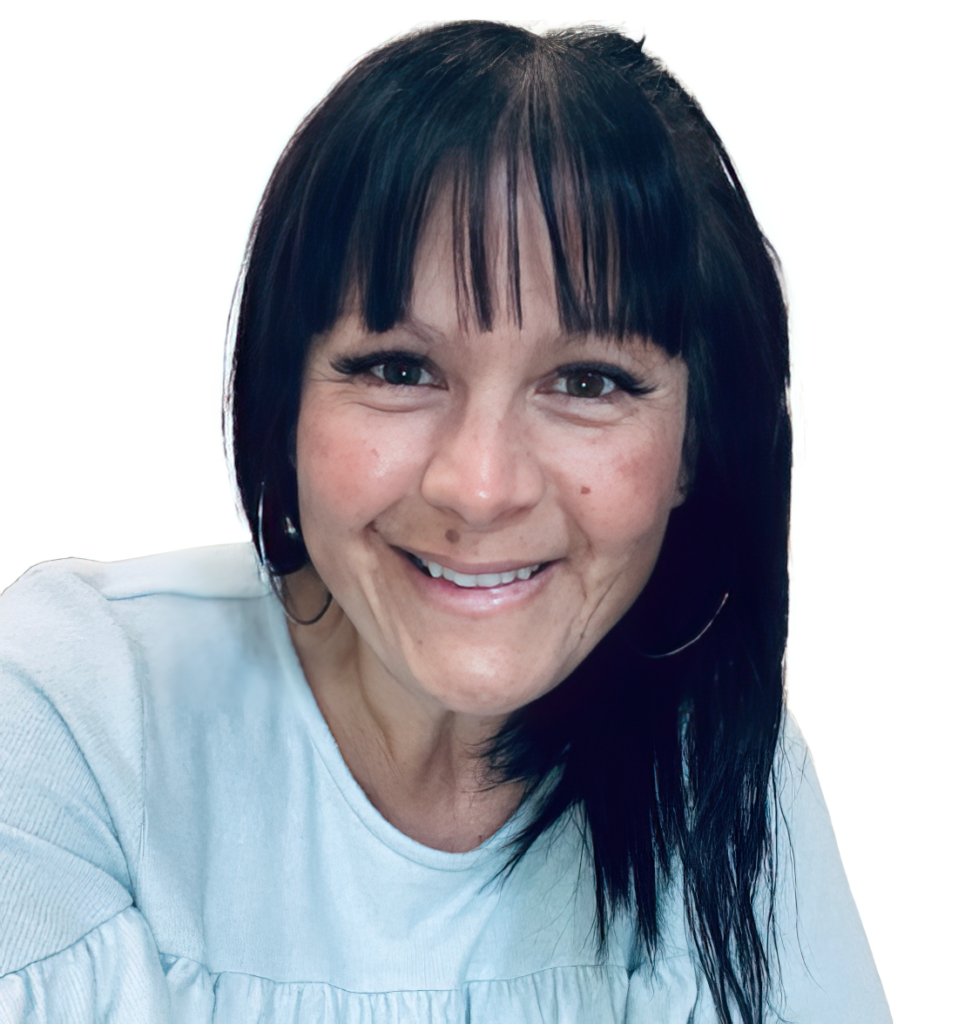
Brea Owen, a California native, has been serving in ministry for nearly thirty years. She and her husband, Tim, served as youth pastors at San Jose Open Bible Church for almost ten years. They then served as youth pastors and associate pastors for thirteen years at Life Church in Concord, California. They now serve as lead pastors of Pathway Church, an Open Bible church in Spanaway, Washington. Tim and Brea have been married for twenty-four years and have three boys: Isaac (20), Jeriah (18), and Grayson (11). Aside from being wife, mom, employee, student, and leader, Brea enjoys spending time with her family, taking walks with her sidekick, Koda, and cooking. Brea is finishing Tier 2 of Discover Ministry School and plans to become licensed with Open Bible.
Caleb Plummer is a youth pastor at The Intersection Open Bible Church in Spokane Valley, Washington. Born and raised in Springfield, Oregon, Caleb always was involved in church in one way or another. He started attending Waypoint Community Church in 2011 and found himself with a calling to youth ministry. He attended college at Bushnell University (previously known as Northwest Christian University) and graduated in December of 2020 with a degree in both Christian Ministry and Mathematics. In his free time, he is either at the movies, at the gym, or spending time with his friends and family.


Johnny Montgomery has been married to his lovely wife, Melody, for twenty years. The couple has three kids: Hannah, Eliyah, and Calvin. Licensed with Open Bible Churches, he has been in ministry for more than twenty years, mostly working in youth ministry. He currently works for South Lane Mental Health and ministers part time as the Connections Pastor at Waypoint Community Church in Springfield, Oregon.
Mike Allison has been an Open Bible minister since 2000. He and his wife, Kristine, along with their three children, planted Discover Church in Lodi, California, in 2021. Along with serving for fifteen years in youth ministry, Mike co-founded Waypoint Community Church in Oregon, then transitioned to lead pastor at Celebration Church in Washington, before answering the call of God to move to Lodi and plant Discover Church. Mike has served as the Pacific Region Youth Director, Pacific Region Emerging Leaders Coordinator and Camp Director, and currently is an at-large regional board member. Mike completed his master’s degree in ministry leadership at Wheaton College in 2023. Mike has a passion for lifelong learning and investing in the next generation of leaders as well as helping people far from Jesus respond to His invitation to “follow me.”
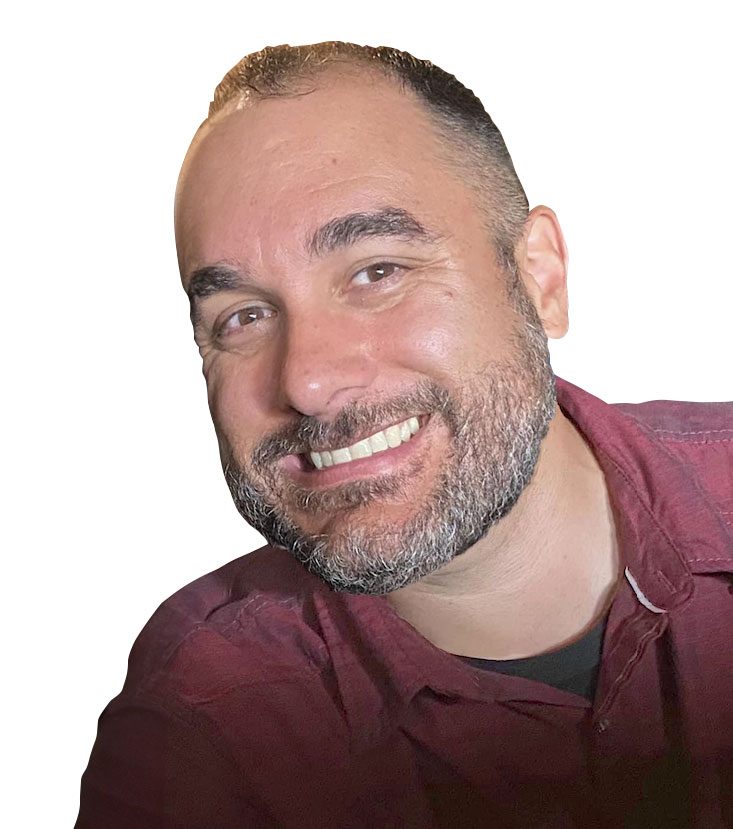
About the Author
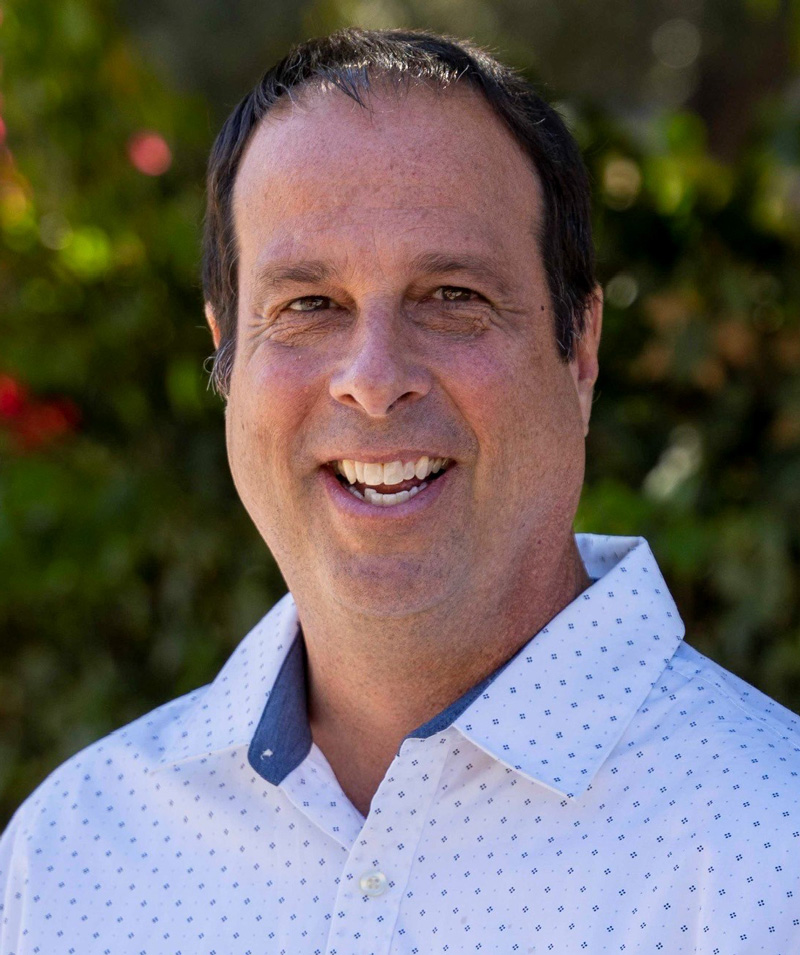
Tim Zakarian is the associate director for the Pacific Region of Open Bible Churches. He lives in Springfield, Oregon, with his wife, Tina, to whom he has been married 36 years. The Zakarians have two adult, married children who are serving in ministry. Michael and his wife, Cheyenne, are the youth pastors at Summit Christian Church of the Open Bible in Los Angeles. Christine McAndrew and her husband, Aaron, are the youth pastors at Waypoint Community, an Open Bible church in Springfield, Oregon. Tim has had many roles in ministry, including youth pastor, regional youth director, associate pastor, executive pastor, church planter, and lead pastor. No matter his role, Tim’s passion for the ministry has always been to mentor and develop leaders.

Spiritual direction…hmmm, sounds like what I get from the Holy Spirit when I pray, so why would I need to meet with a spiritual director when I can do this on my own? Seems unnecessary, right? Not to mention, I’m a guy; we never ask for directions.
That was my thinking a few years ago, until the day I got a call from another minister who was training to be a spiritual director. She needed to log a certain number of practice hours to finish her training, and she asked if I would be her “guinea pig.”
The call had “coincidentally” come in the middle of a challenging season; my pastoral duties felt relentless, and I was going through a profound life change. I felt empty inside as I wrestled with a nagging question: “Am I really hearing God clearly?” Unable to talk through my struggle with very many people, I had been feeling spiritually stuck. The person calling was someone I trusted, so I agreed to be a part of her training process. I thought I was helping her out, but little did I know this decision would stand as a cornerstone of my spiritual and mental health moving forward.
Spiritual direction is like having a wonderful (dare I say, sacred) friend who walks alongside you and gently guides you to notice and respond to the presence of God in your life.
Spiritual direction is like having a wonderful (dare I say, sacred) friend who walks alongside you and gently guides you to notice and respond to the presence of God in your life. Believe it or not, even the best of us can miss Him in the middle of our emotional and mental upheavals. Unlike traditional counseling or mentorship, spiritual direction focuses on deepening our relationship with God, helping us become more aware of His presence in our everyday experiences.
A Transformative Encounter: Experiencing the Father Three Ways
There’s one spiritual direction session that particularly stands out in my mind. My mom had just passed away, and my dad was in the final stages of his life. It had been a tough year of loss, and I was doing my best to keep it together. As I shared with my spiritual director, she made a suggestion. She said, “Gary, take the next ten minutes to sit before the Father and ask Him what He wants to say to you in this season.”
I muted the microphone, sat in silence, and stared out the window of my office into my backyard. It was a beautiful day, and the wind was rustling through the trees. Things moving by some unseen force. As I sat there, God reminded me of three snapshots (memories) with my dad. The first was a memory of being at the beach with him when I was four and his taking me into the deep water. I remember protesting that I didn’t want to go out there but also feeling safe because I was held tightly in my father’s arms. The second was a memory of when I was twenty and we took a trip together. It was on that trip that I felt my father, through his actions, take his mantle of authority and leadership and place it on my shoulders. The third snapshot wasn’t a true memory but a glimpse into the future. I was about to visit my dad in a month – it was to say goodbye as he was in the final stages of life on earth. My agenda was simple: I was just going to spend time with Dad.
In those pictures, with the wind blowing through the trees, the Father used my father to help me encounter Him. I’ll never forget the three things God whispered to me as I pondered those three snapshots:
Gary, I’m with you; you’re safe.
Gary, I’ve given you everything you need to fulfill what I’ve called you to do; I trust you.
Gary, all I desire is for you to spend time with me and enjoy my presence.
Those past and future joys were a reminder from my heavenly Father that I could take the path ahead because He was with me. I’m not sure I would have had such a profound experience had it not been for the preceding conversation with my spiritual director and our subsequent debrief.
Integrating Spiritual Direction into Pastoral Ministry
Moments in this and following sessions have been a game changer for me, helping me become a better leader and follower. I now approach decisions with a greater sense of grounding, choosing to rely on prayerful discernment and feedback from someone who’s spiritually mature and not emotionally tied to the situations. I’ve also learned to listen better, not just to God but also to people.
Spiritual direction has been a transformative experience for me, helping me grow both personally and professionally.
Spiritual direction has also been a huge help with my mental health. Regular sessions provide a sanctuary from the incessant demands of ministry and allow me to process those stressors in a safe context. I’ve learned to be more resilient, thanks to the reflective exploration of my spiritual journey, and I feel more balanced and purposeful.
If you’re a minister who hasn’t tried spiritual direction yet, I highly recommend it. Here are a few things to keep in mind:
- Find a spiritual director who’s trained to help others on their spiritual journey.
- Make sure you prioritize regular meetings. Consistent engagement allows for a deeper unfolding of your spiritual narrative and allows for sustained growth.
- Be open and vulnerable. Don’t be afraid to talk about the good and bad parts of your spiritual life.
Spiritual direction has been a transformative experience for me, helping me grow both personally and professionally. Remember, we all need help sometimes.
About the Author

Gary Kahn
Gary Khan was born on the island of Trinidad in the Caribbean. He moved to America when he was twenty to pursue his education and calling to be a pastor. He met his wife DeLaine at Eugene Bible College (now New Hope Christian College) and upon their graduation, they were married and began working at Desert Streams Church in Santa Clarita, CA. After thirty-two years as a pastor, Gary became an Executive Director of Operations for Marketplace Chaplains. He is the author of devotionals including Reset and Greater and his most recent book, That Didn’t Turn Out the Way I Thought.

On the fifth day of creation, our wonderful God showed himself in a brand new way. He began to create the living creatures that walk among us. This expression of His creation has shown itself throughout history; from Noah’s dove, to Balaam’s donkey, to Jonah’s whale and Daniel’s lions, God has continued to use animals in His grand plan and purpose.
We can still use these animals as a metaphor for God’s love and guidance. One notable example comes from Bob Sjogren’s book Cat and Dog Theology: “A dog says, ‘You pet me, you feed me, you shelter me, you love me, you must be God.’ A cat says, ‘You pet me, you feed me, you shelter me, you love me, I must be God.’”
As true as this may be, something wonderful happens when the molds break.
[God] certainly doesn’t want to drag us from one destination to the next. He would rather we follow Him willingly, eager to remain in His presence.
In our family, we recently experienced an interesting phenomenon when it came to our pets. To understand the story better, you need to understand our animals. Ralphie is our young, spirited Maltipoo. He has never met a stranger he didn’t love. He is sweet, loyal and in many ways the ideal companion.
Then we have our chihuahua, Sally. We found Sally roaming our neighborhood in 2014 with no tags and no microchip. She had obviously been mistreated, and when I took her to the vet, they found so many things wrong with her that I was advised, “Don’t be in a huge hurry to find her owner.”
We cleaned Sally up, and two weeks later she was legally ours. While she is affectionate to us and our kids, to this day, if I lift my hand to give her a pat on the head, she winces as if I am going to hit her (something I have never done and never intend to do).
Ralphie and Sally’s unique natures show themselves on our nightly walk around the neighborhood.
Ralphie tries his hardest to pull on the leash and run ahead. He so desperately wants to lead whoever is holding the leash that he nearly chokes himself on his collar. (We’ve had to switch to a harness.) He is unaware that he is only eight pounds, and his actions make little to no difference in the direction we are going.
Sally, however, must be practically dragged throughout the walk. She is timid and afraid to take a step that she isn’t sure is safe.
It’s quite a sight to have such different dogs reacting to the same thing.
Witnessing this phenomenon gave me pause, and I couldn’t help but think what a picture this is for the diverse ways we respond to the Holy Spirit’s leading in our lives.
So many people are like Ralphie. They try to tell God where they want to go without any regard to His guidance. They would rather choke themselves on their own will than listen to what He has to say. Others are like Sally and struggle to fully trust the Lord. For them to move, the Holy Spirit must practically drag them to the next place.
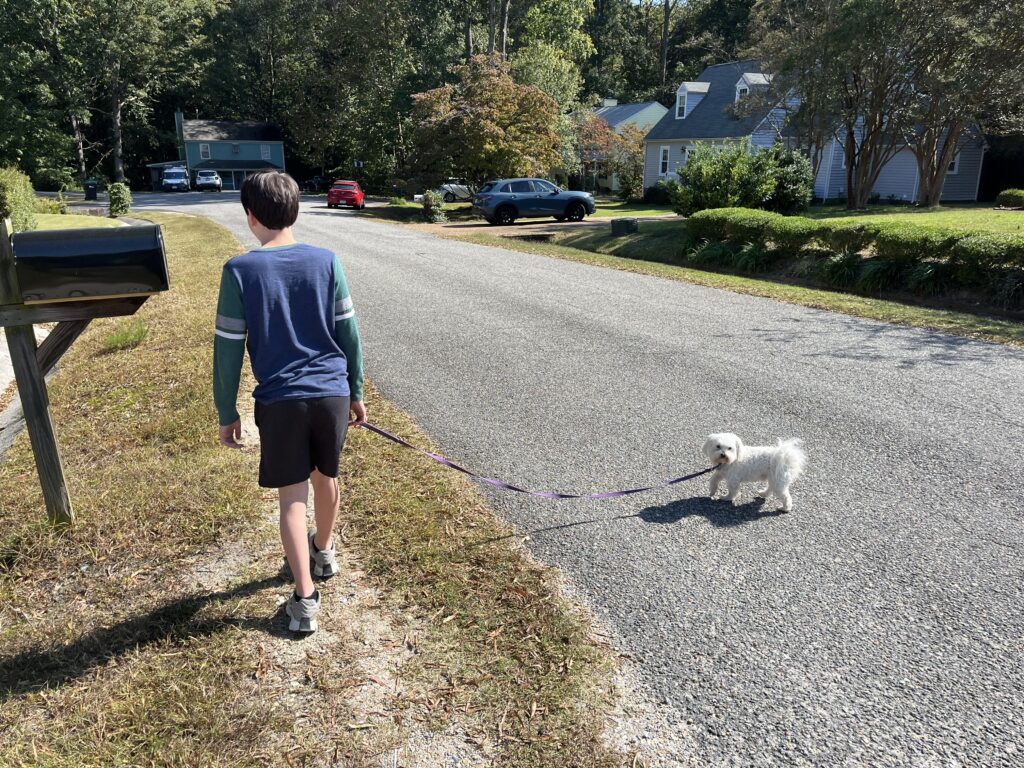
It sounds like a simple premise, but so many followers of God fall into these two opposite extremes. People miss their destinies when they act like Ralphie and Sally.
But there is another pet in our household whom I have not told you about. His name is Caesar, and he is an old, wise cat. We got Caesar the year we were married, and he lived up to his noble name every chance he got. Years ago, on our nightly walks with the dogs, Caesar began doing something amazing.
By his own free will, he would simply follow us on our walks. No need for a leash. No need for us to coax him. He just followed our gentle guidance every night for the mere purpose of being with us. Every now and then we would have to call his name, but he was always nearby.
I believe that in a world full of Ralphies and Sallys, God would rather we be like Caesar. The Lord doesn’t want us to tell Him where we are going rather than let Him lead, and He certainly doesn’t want to drag us from one destination to the next. He would rather we follow Him willingly, eager to remain in His presence.
In Matthew 8:18-22, two men express a desire to follow Jesus. The first is overly eager, not knowing what he is getting himself into. Jesus gives him a stern warning, explaining that he doesn’t know what he’s asking. The second man hesitates and says he needs to bury his father first. We never learn the fate of either man, but I hope they both abandoned their natural tendencies and learned to faithfully follow.
Whether you struggle with being too aggressive on your journey with God or whether you’re entirely too scared to take another step, I believe we can all grow in learning to be led
After sixteen years of being our cat, Caesar died peacefully this past March, but not before we had gotten a kitten named CJ. CJ is full of life and extremely playful. She was always so intrigued by our old friend Caesar that she started following him everywhere he went, even if it meant a walk around our neighborhood.
Caesar indirectly made a disciple with our young kitten, who now follows us on our walks every night. Despite how aggressive Ralphie wants to be or how timid Sally is, we now have CJ, just following along wherever we go.
Whether you struggle with being too aggressive on your journey with God or whether you’re entirely too scared to take another step, I believe we can all grow in learning to be led. If we will stay close to Jesus, we cannot help but fulfill His destiny for our lives.
About the Author
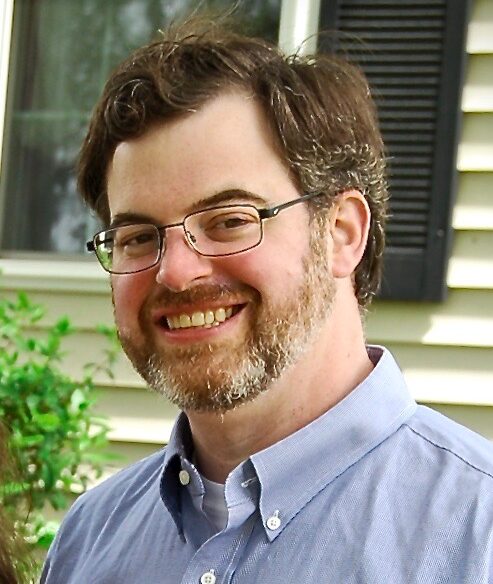
Bill Francavilla
Bill Francavilla is the lead pastor at Living Hope, an Open Bible church in Williamsburg, Virginia. Having lived in Virginia nearly his entire life, he attended Lynchburg College, where he studied history and theater. In 2017 Bill received his master’s degree in theological studies from Liberty University. He has been active in missions to Mexico, Dominican Republic, and Cuba. He and his wife, Jessica, have four children: Alex, Liam, Rita Grace, and Gino.

I am Shane Blackledge, and my wife Amber and I are the founding pastors of Cultivate Church in St. Louis, Missouri. My story is one of transformation and God’s grace, showing how He can use anyone to build His kingdom.
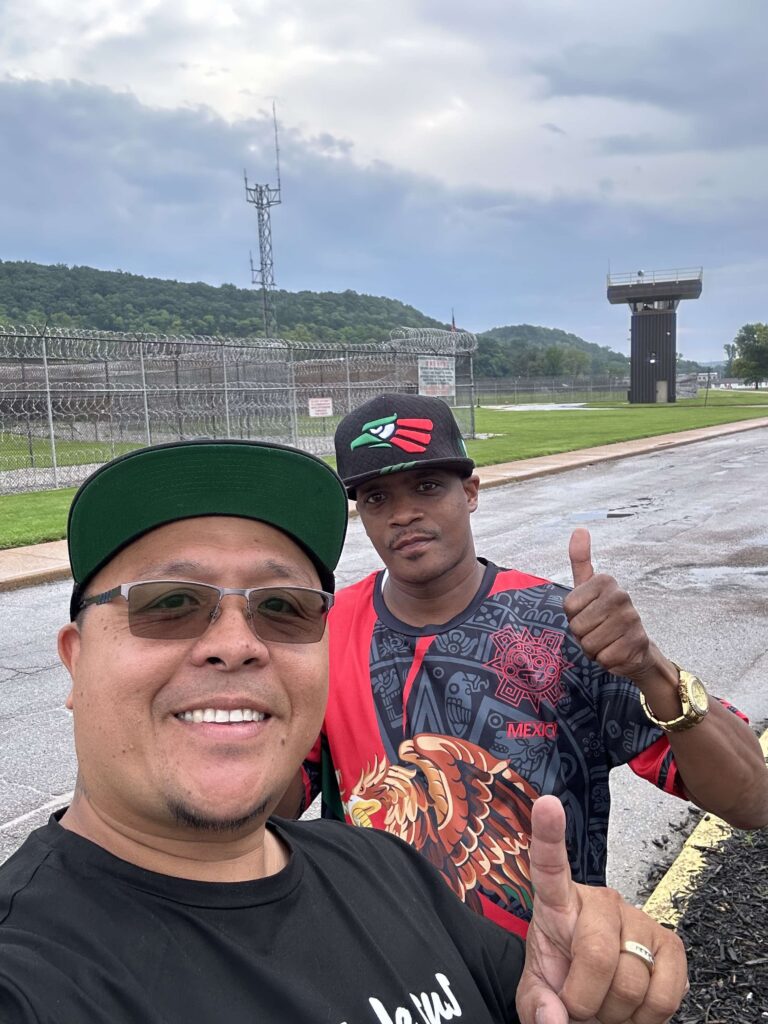
I was born in Colorado at the Air Force Academy Hospital. My father served in the Vietnam War, and while stationed in Taiwan, he met my mother and they got married. When I was six, my parents separated, and my mother moved back to Taiwan, leaving me devastated. As a kid, I faced racism and extreme poverty. I battled depression, anxiety, and thoughts of suicide. I started smoking and drinking at eight years old, joined a gang at age thirteen, and was using meth daily by the time I was fourteen.
At age seventeen, I was arrested and sentenced to thirty years in prison for selling drugs. I found myself in my jail cell wanting to end it all. On my night stand I found a Gideon Bible, and I opened it right to John 3:16. As I sat there reading, I realized I was a sinner, but that God created me and I had a purpose to live. I repented and asked Jesus to forgive me. I felt the Father’s love and the presence of the Holy Spirit in an indescribable way.
After my release, I struggled transitioning back into society (finding a job, paying rent, and finding a church that would accept me). I was discouraged and soon relapsed on meth. During the years of my addiction, I was sent to five prisons and was incarcerated for over six years. In 2006, after nearly dying from an overdose, I woke up from a coma and realized God had saved me from death. That day I fully surrendered to Christ, and that’s when my real transformation began.
In 2006, after nearly dying from an overdose, I woke up from a coma and realized God had saved me from death
God restored what addiction had taken from me. I have now been clean from meth for seventeen years. In 2013, I married Amber. We started attending Waverly Life Church, served as youth leaders, and eventually started a Celebrate Recovery program. In 2022, God called us to plant Cultivate Church in St. Louis, Missouri. We resigned from all ministries and jobs and sold our home. In April of 2023, we started house church gatherings which quickly grew in Christ and numbers. We launched our first Sunday gathering in October of 2023.
Today, we are a church without walls, modeled after the early church in Acts. We have regular church gatherings geared towards discipleship, street ministry, addiction recovery, Christian hip-hop events, prison ministry, and nursing home visits. We work with local treatment centers and recovery programs to support and mentor people. We have partnered with churches and ministries to organize monthly inner-city mission trips.
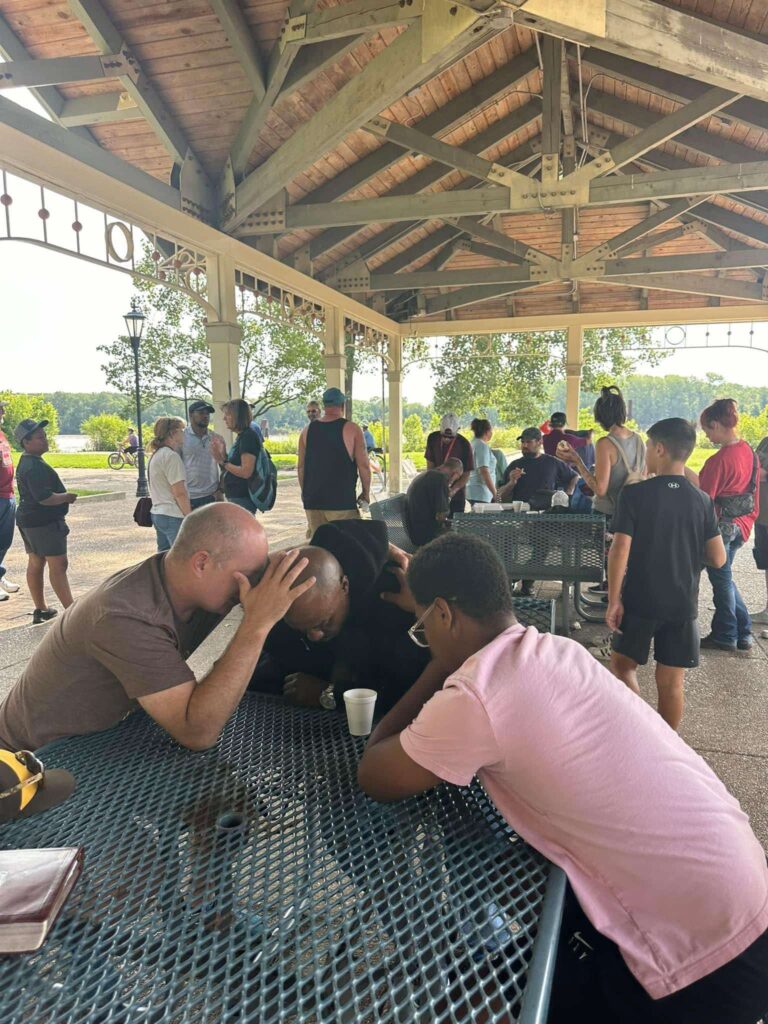
One way God has used my story is with my podcast: “Kingdom Minded,” which streams into 1000 prisons across the country on over one million inmate tablets. In partnership with the Edovo learning app, the podcast focuses on sharing testimonies and teaching Biblical principles.
Looking back, I am amazed at what God has done. In just a year our church has grown from a small group in our living room to a thriving community, passionate about sharing God’s love. Amber and I are excited about the future. We believe God is just getting started with Cultivate Church.
He can use anyone, even a former addict and convict like me, to build His kingdom.
My story and the story of Cultivate Church are really about God’s faithfulness. He can use anyone, even a former addict and convict like me, to build His kingdom. All the glory goes to Him.
To donate toward our prison ministry and homeless outreach, visit wearecultivatechurch.org or check out our Blessing Bags Gift Registry at HERE.
About the Author
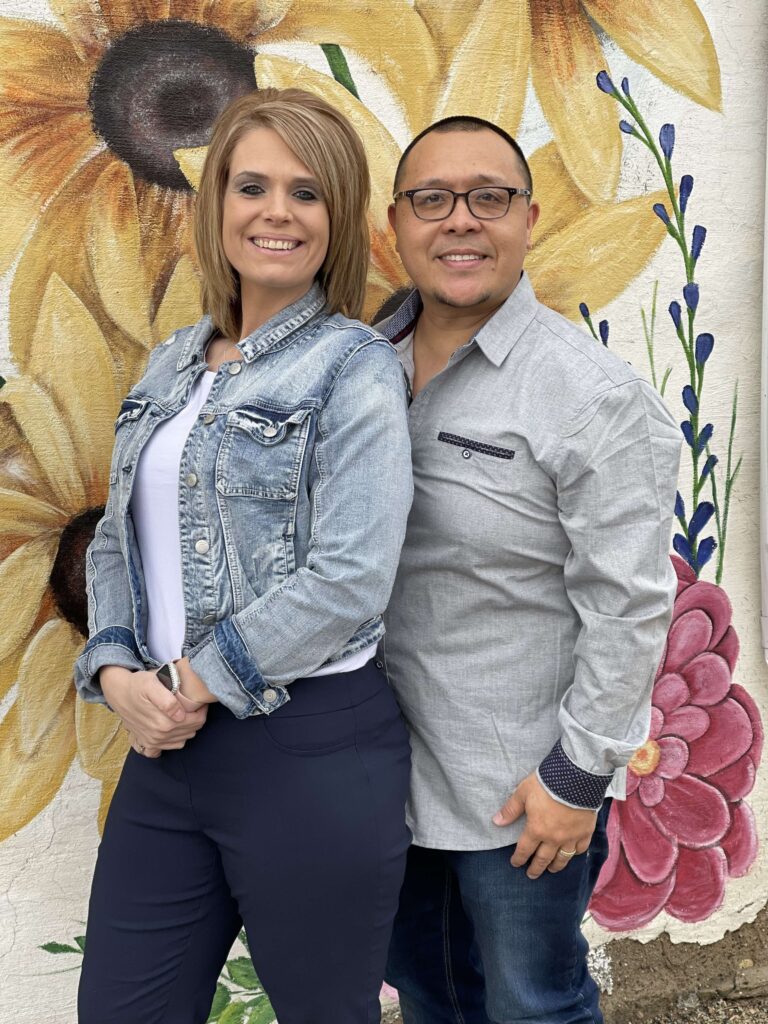
Shane R. Blackledge
Shane R. Blackledge is the co-founder and senior pastor of Cultivate Church. He and his wife Amber started Cultivate Church in their home in 2023. Today, the church is known for spreading the Gospel and being the church without walls. Shane’s podcast, “Kingdom Minded,” is available in over 1000 prisons on inmate tablets on the Edovo Learning App. Through testimonies and Bible principles, the podcast aims to teach, inspire, and equip Christians to live their best life now. Shane is an author and speaker, and his books From Prison to Purpose and Overcoming Codependency are available on Amazon. Shane and Amber have four children and live in St. Louis, Missouri.







